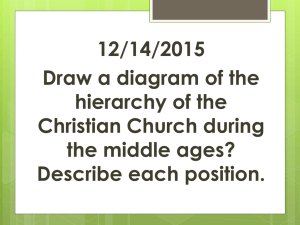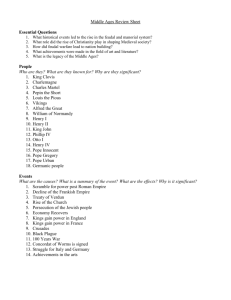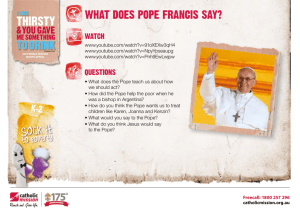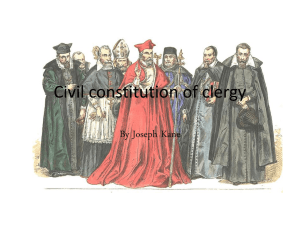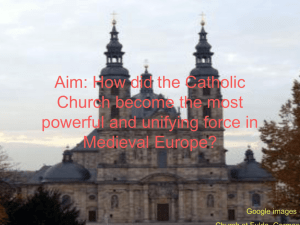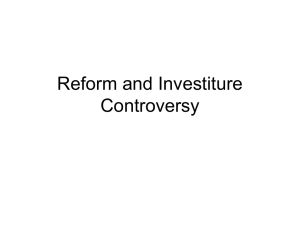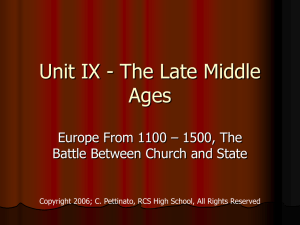Readings Package – The Medieval Church Part 2
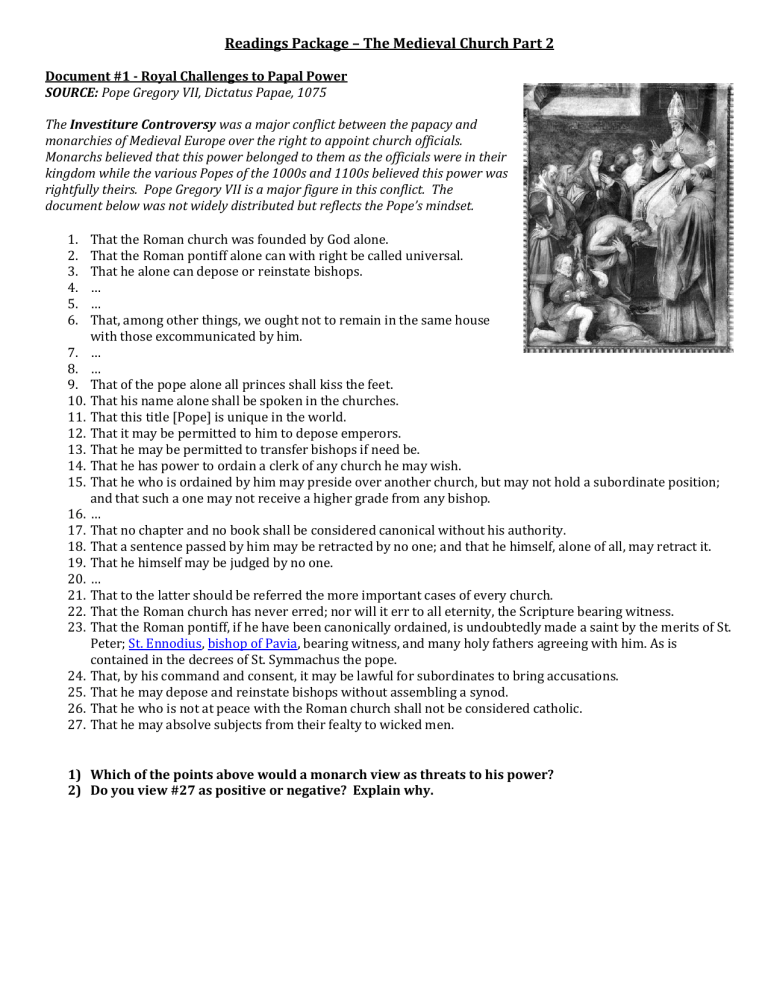
Readings Package – The Medieval Church Part 2
Document #1 - Royal Challenges to Papal Power
SOURCE: Pope Gregory VII, Dictatus Papae, 1075
The Investiture Controversy was a major conflict between the papacy and monarchies of Medieval Europe over the right to appoint church officials.
Monarchs believed that this power belonged to them as the officials were in their kingdom while the various Popes of the 1000s and 1100s believed this power was rightfully theirs. Pope Gregory VII is a major figure in this conflict. The document below was not widely distributed but reflects the Pope’s mindset.
1.
That the Roman church was founded by God alone.
2.
That the Roman pontiff alone can with right be called universal.
3.
That he alone can depose or reinstate bishops.
4.
…
5.
…
6.
That, among other things, we ought not to remain in the same house with those excommunicated by him.
7.
…
8.
…
9.
That of the pope alone all princes shall kiss the feet.
10.
That his name alone shall be spoken in the churches.
11.
That this title [Pope] is unique in the world.
12.
That it may be permitted to him to depose emperors.
13.
That he may be permitted to transfer bishops if need be.
14.
That he has power to ordain a clerk of any church he may wish.
15.
That he who is ordained by him may preside over another church, but may not hold a subordinate position; and that such a one may not receive a higher grade from any bishop.
16.
…
17.
That no chapter and no book shall be considered canonical without his authority.
18.
That a sentence passed by him may be retracted by no one; and that he himself, alone of all, may retract it.
19.
That he himself may be judged by no one.
20.
…
21.
That to the latter should be referred the more important cases of every church.
22.
That the Roman church has never erred; nor will it err to all eternity, the Scripture bearing witness.
23.
That the Roman pontiff, if he have been canonically ordained, is undoubtedly made a saint by the merits of St.
Peter; St. Ennodius , bishop of Pavia , bearing witness, and many holy fathers agreeing with him. As is contained in the decrees of St. Symmachus the pope.
24.
That, by his command and consent, it may be lawful for subordinates to bring accusations.
25.
That he may depose and reinstate bishops without assembling a synod.
26.
That he who is not at peace with the Roman church shall not be considered catholic.
27.
That he may absolve subjects from their fealty to wicked men.
1) Which of the points above would a monarch view as threats to his power?
2) Do you view #27 as positive or negative? Explain why.
Document #2 – Excommunication of Henry IV
SOURCE: Pope Gregory VII to King Henry IV, February 22, 1076.
King Henry IV, also Holy Roman Emperor, became hostile to Pope Gregory VII during the Investiture Controversy. The Pope blamed King Henry for his kidnapping and ultimately excommunicated him and all the bishops that Henry appointed. The document below is Henry’s notice of excommunication.
On the strength of this belief (the Pope is second only to God) therefore, for the honor and security of the church, in the name of Almighty God, Father, Son and Holy Ghost, I withdraw, through thy power and authority, from Henry the king, son of Henry the emperor, who has risen against the church with unheard of insolence, the rule over the whole kingdom of the Germans and over Italy. And I absolve all Christians from the bonds of the oath which they have made or shall make to him; and I forbid any one to serve him as king. For it is fitting that he who strives to lessen the honor of the church should himself lose the honor which belongs to him. And since he has not obeyed as a Christian, and has not returned, ignored my commands which I issued to him for his own salvation; I now separate him from the church to let all know that the
Church of the living God will forever triumph over evil.
Document #3
SOURCE: Jean de Joinville, a friend of King Louis IX [St. Louis], 13c.
The Bishop Guy of Auxerre spoke to him [Louis IX] for all of them, and said: "Sire, these archbishops and bishops here present have charged me to tell you that
Christendom decays and melts in your hands . . . because no man stands in fear of excommunication (being exiled from the church). We require you therefore to command your bailiffs and your sergeants to compel all excommunicate persons . . . to make satisfaction to the Church." And the king replied that he would willingly order his bailiffs and sergeants to constrain [compel] excommunicate persons in the manner desired, provided full cognizance of the sentence were given to him in each case, so that he might judge whether the sentence were righteous or not. And they consulted together, and answered the king that they would not give him such cognizance, because the matters involved were spiritual. And the king replied in turn that he would not... order his sergeants to constrain excommunicate persons to obtain absolution For if I did so," said the king, "I should be acting contrary to
God and against right.
1) How does the King justify defying the Pope?
Document #4
(SOURCE: Pope Boniface VIII’s papal bull, Clericis Laicos, 14c.)
They are not content with their limitations, the laity [non-clergymen] strive for forbidden things and give free reign to the pursuit of illicit (sinful/illegal) gain. They do not prudently observe that all control over the clergy . . . is denied to them, but they impose heavy burdens . . . upon the churches themselves, . . .exacting tallages [taxes] and other contributions from. them. We strictly command all prelates [church officers] and ecclesiastical (church personnel) persons . . . that they shall not hereafter acquiesce in any such demands.
1) Why does the Pope feel that Kings are over-stepping their “limitations?”
2) How would Pope Boniface VIII feel about the stance of Louis IX in document #3?
